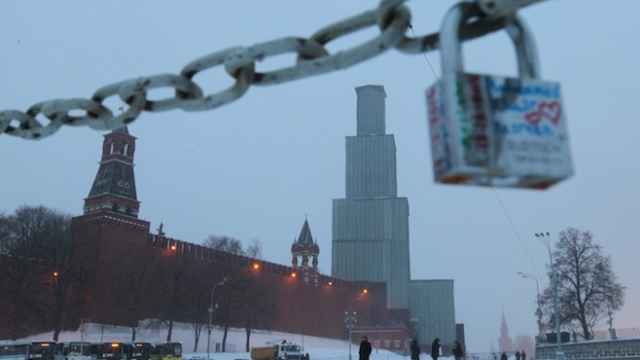MOSCOW — An economic downturn exacerbated by a falling ruble and Western sanctions over Ukraine has hit fuel demand in Russia, forcing energy companies to cut retail prices and adding to the pressure many of them are feeling from lower oil prices.
The ruble has plunged around 50 percent against the dollar and oil, Russia's chief export, has declined about the same, prompting President Vladimir Putin to predict Russia's economy will suffer two "most unfavorable" years.
With car sales expected to tumble 25-35 percent this year as recession takes hold, falling demand for fuel is set to persist.
Gazprom Neft, the biggest player in the small-scale wholesale market for the Moscow region, cut fuel prices by up to 4 percent to around 34,100 rubles ($521) per ton of gasoline and 31,700 rubles per ton of diesel last week.
Fuel sales at commodity exchanges have also fallen.
The St. Petersburg International Mercantile Exchange and The Exchange St. Petersburg, the only exchanges in Russia which trade oil products, sold 357,000 ton of oil products worth 9.2 billion rubles ($140.5 million) on Feb. 2-6, down 5 percent in monetary terms from the previous week, data showed.
In Siberia, demand has fallen sharply.
"Many factories have been cutting costs, they introduced a four-day working week … Even traffic jams have disappeared," an employee at an oil storage facility in east Siberian city of Irkutsk said.
Market insiders said demand had been in decline following a decision by the central bank to hike interest rates to defend falling ruble.
The bank raised its key interest rate to 17 percent from 10.5 percent in mid-December. Now it stands at 15 percent.
At the same time, wholesale domestic prices have started to rise, catching up with an increase in profitability from exports after cuts in export duties from Jan. 1.
Traders said that exports of diesel have offered a premium of up to 10,000 rubles per ton compared with domestic sales after exports became more profitable when the government slashed the duty on them and raised the mineral extraction tax.
The tax regime change, taken to try to balance an overstretched budget, has already led to a surge in oil products exports from Russia to Europe.
A Message from The Moscow Times:
Dear readers,
We are facing unprecedented challenges. Russia's Prosecutor General's Office has designated The Moscow Times as an "undesirable" organization, criminalizing our work and putting our staff at risk of prosecution. This follows our earlier unjust labeling as a "foreign agent."
These actions are direct attempts to silence independent journalism in Russia. The authorities claim our work "discredits the decisions of the Russian leadership." We see things differently: we strive to provide accurate, unbiased reporting on Russia.
We, the journalists of The Moscow Times, refuse to be silenced. But to continue our work, we need your help.
Your support, no matter how small, makes a world of difference. If you can, please support us monthly starting from just $2. It's quick to set up, and every contribution makes a significant impact.
By supporting The Moscow Times, you're defending open, independent journalism in the face of repression. Thank you for standing with us.
Remind me later.





